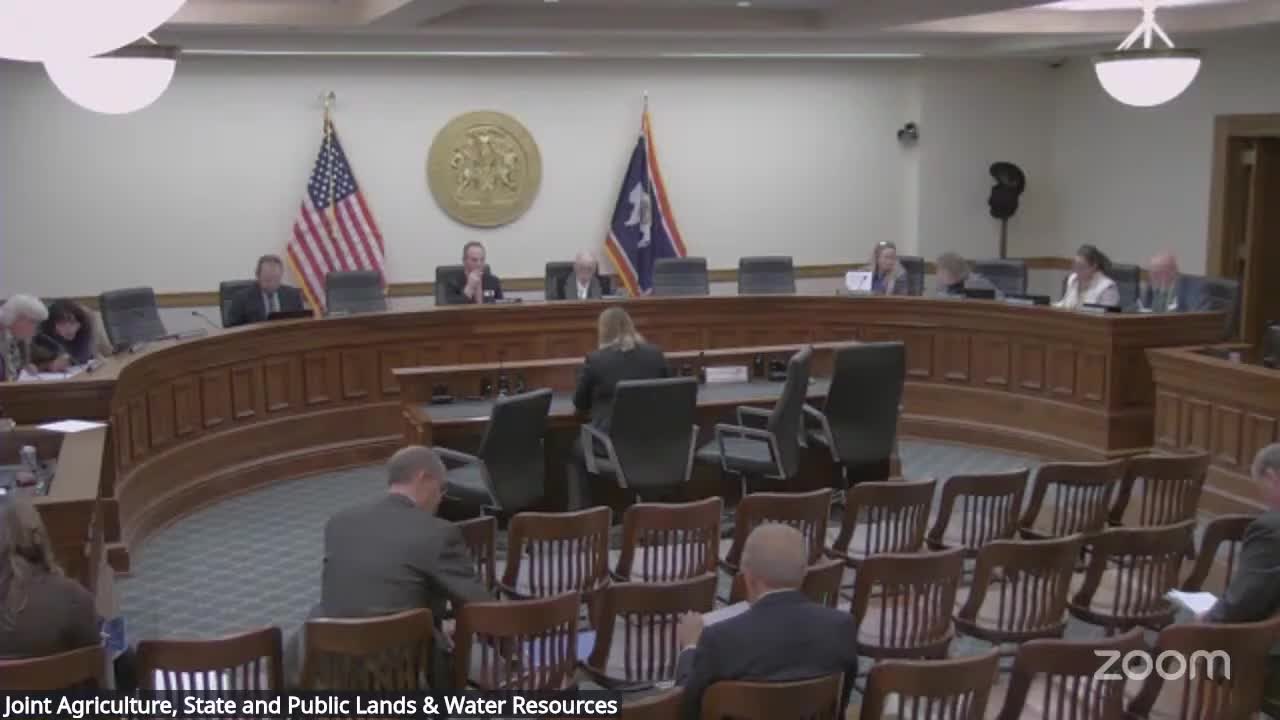Committee advances Clean Air and Geoengineering Prohibition Act after adding DEQ authorities and staffing
Get AI-powered insights, summaries, and transcripts
Subscribe
Summary
The committee advanced a draft banning intentional atmospheric engineering in Wyoming (26LSO211) after debate and multiple amendments giving the Department of Environmental Quality (DEQ) authority to investigate and seek court orders, plus a two‑FTE appropriation for implementation. The committee approved the bill, 6-5.
The Agriculture, State & Public Lands & Water Resources Committee advanced 26LSO0211, the "Clean Air and Geoengineering Prohibition Act," after approving amendments that expand enforcement and monitoring authority for the Wyoming Department of Environmental Quality and add two full-time positions to implement the measure.
Under the draft presented to the committee, the bill would create a new statute (proposed W.S. 35-11-2204) prohibiting the intentional injection, release or dispersal of atmospheric contaminants into Wyoming’s airspace for the purpose of altering climate, weather, or solar radiation. The draft would also repeal existing weather-modification statutes (W.S. 9-1-1905 through 9-1-1909) and direct DEQ to develop implementing rules.
Representative Tony Locke (House District 35) told the committee he supported the measure as a response to what he described as large-scale geoengineering activity. “This is really the hottest topic,” Locke said during public comment, urging lawmakers to act.
Todd Parfit, director of the Wyoming Department of Environmental Quality, told lawmakers the agency could investigate complaints and pursue enforcement under the draft but cautioned that rulemaking and investigative work would require resources. “We would have to investigate complaints that we receive,” Parfit said, and recommended the committee consider appropriate staffing and funding for rule development, inspections and potential litigation.
The committee approved an amendment from Senator Crago that directed DEQ to study the presence of listed atmospheric contaminants and to monitor aircraft, drones, balloons, rockets, space-based platforms and relevant ground facilities; it also authorized DEQ to petition a court for cease-and-desist relief. The committee also approved a second Crago amendment that provided funding for two DEQ full-time positions and $500,000 of appropriation in the upcoming biennium to implement the new duties.
The University of Wyoming’s atmospheric scientist Jeff French testified that the university conducts cloud- and aerosol-related research and that a broad ban could unintentionally restrict university research and federally sponsored efforts to study aerosol–cloud interactions. “By eliminating the ability to be able to do these small scale experiments, we’re essentially taking away something that Wyoming and the University are leaders in,” French said, urging caution about research exemptions.
DEQ Director Parfit reiterated that the agency already fields occasional public complaints and would need staff and monitoring equipment to carry out the bill’s enforcement and rulemaking tasks. He estimated implementation would likely require two employees and identified additional monitoring stations or equipment as capital needs that would affect cost.
Public commenters included citizens and industry representatives offering competing views. Augustus (Gus) Strico, participating remotely, argued equipment and radar-recorded flight and precipitation patterns can document cloud-seeding events; other witnesses urged careful drafting to avoid disrupting permitted agricultural activities such as crop-dusting or authorized snowmaking.
After lengthy debate and dozens of amendments proposed and considered, the committee approved the bill as amended. The roll-call vote was recorded as six in favor, five opposed, with three members excused. Committee records list the result as 6 yes, 5 no; the bill will move forward as a committee-sponsored draft with the approved DEQ implementation language and the $500,000 appropriation for staffing.
The committee also discussed narrower technical edits, exemptions for routine aviation or satellite operations, and the need to define terms such as “large-scale” and to align criminal penalties to the scale of violations. DEQ had suggested several drafting adjustments to clarify enforcement authority and to avoid unintended conflicts with existing Environmental Quality Act provisions.
Ending note: With the committee vote in favor, 26LSO0211 moves forward with new DEQ responsibilities and a modest appropriation to support rulemaking and enforcement; the measure will reach the legislative calendar for subsequent consideration.
